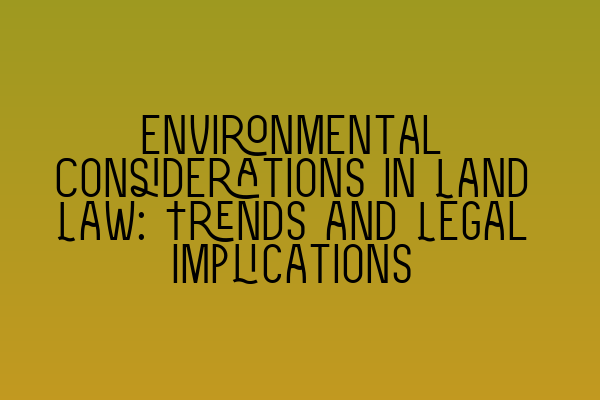At SQE Property Law & Land Law, we understand the crucial role of environmental considerations in land law. As the world becomes more aware of the importance of sustainability and protecting our natural resources, these environmental considerations have become an integral part of property transactions and legal frameworks. In this blog post, we will explore the latest trends in environmental considerations in land law and their legal implications.
What are Environmental Considerations in Land Law?
Environmental considerations in land law refer to the assessment and management of potential environmental risks and impacts associated with the use and development of land. These considerations have gained prominence in recent years due to growing concerns over climate change, pollution, and ecological preservation.
One of the key aspects of environmental considerations in land law is the concept of sustainable development. Sustainable development aims to meet the present needs without compromising the ability of future generations to meet their own needs. This approach recognizes the interdependence between economic development, social progress, and environmental protection.
Trends in Environmental Considerations
1. Environmental Due Diligence: Environmental due diligence has become a standard practice in property transactions. It involves conducting assessments to identify potential environmental liabilities and risks associated with a particular property. Buyers and developers must assess factors such as soil contamination, air pollution, water quality, and potential habitat destruction.
2. Green Building and Energy Efficiency: There is a growing emphasis on constructing environmentally sustainable buildings. Green building practices focus on reducing energy consumption, minimizing waste, and using renewable materials. Developers need to comply with green building standards and obtain certifications such as LEED (Leadership in Energy and Environmental Design).
3. Conservation and Biodiversity Protection: Landowners and developers are increasingly obligated to protect and preserve natural habitats and biodiversity. This includes identifying and protecting endangered species, implementing conservation plans, and mitigating any potential harm to the local ecosystems.
4. Climate Change Adaptation: Climate change poses significant risks to properties, especially in coastal areas prone to rising sea levels and extreme weather events. Landowners and developers must take measures to adapt to these changes, such as implementing flood-resistant designs, enhancing drainage systems, and considering the long-term viability of investment properties.
Legal Implications
The evolving trends in environmental considerations in land law have several legal implications:
1. Regulatory Compliance: Developers and landowners must navigate a complex web of environmental regulations and laws. Failure to comply with these regulations can result in substantial fines, legal disputes, and reputational damage. It is essential to stay updated with the latest environmental legislation and seek legal advice to ensure regulatory compliance.
2. Contractual Obligations: Environmental considerations are increasingly incorporated into property contracts. Buyers and sellers may include clauses regarding environmental liabilities, remediation responsibilities, and compliance with environmental regulations. Legal professionals play a vital role in drafting and negotiating these contracts to protect clients’ interests.
3. Potential Liabilities and Litigation: Environmental risks, such as contamination or pollution, can lead to legal disputes and liabilities. Parties involved in property transactions may face claims for damages, cleanup costs, or injunctive actions. Legal experts in environmental law can provide guidance in evaluating and managing these potential liabilities.
4. Financial and Reputational Risks: Failing to address environmental considerations can have significant financial and reputational consequences. Investors and lenders are increasingly factoring environmental sustainability into their decision-making processes. Companies that prioritize sustainability and environmental responsibility are more likely to attract investors, secure financing, and create positive brand reputation.
Environmental considerations in land law are not only a legal requirement but also a moral obligation. As legal professionals specializing in property and land law, we are committed to ensuring that our clients understand and comply with environmental considerations. By integrating sustainability into property transactions, we can contribute to a greener and more sustainable future.
For more insights into contract law and related topics, check out these articles:
- Misrepresentation in Contracts: Unveiling Deceptive Practices
- A Closer Look at SQE Contract Law Syllabus
- SQE Contract Law: Analyzing Landmark Cases and Influential Judicial Decisions
- Understanding Contractual Capacity: Rights and Limitations
- Interactive SQE Mock Tests for Contract Law: Test Your Knowledge
